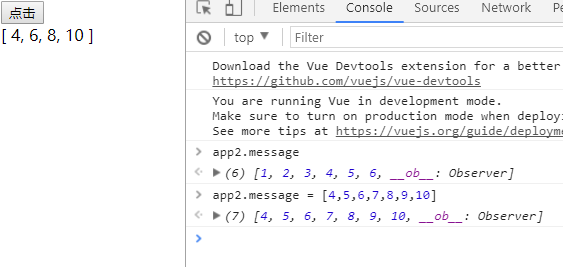您好,登录后才能下订单哦!
本篇文章给大家分享的是有关Vue中TodoList如何使用,小编觉得挺实用的,因此分享给大家学习,希望大家阅读完这篇文章后可以有所收获,话不多说,跟着小编一起来看看吧。
1. methods
methods类似react中组件的方法,不同的是vue采用的与html绑定事件。
给个例子
/*html*/ <input type="button" value="点击" v-on:click='handlClick' id="app">
/*js*/
var app = new Vue({
el:'#app',
methods:{
handlClick:function(){
alert('succeed!');
},
}
})通过在input标签中的vue命令 v-on命令绑定handlClick事件,而handlClick事件是写在methods属性里的
2. computed
/*html*/
<div id="app2">{{even}}</div>/*js*/
var app2 = new Vue({
el:'#app2',
data:{
message:[1,2,3,4,5,6]
},
computed:{
even:function(){ //筛选偶数
return this.message.filter(function(item){
return item%2 === 0;
});
},
},
});可以看到筛选出来了message中的偶数,现在在控制台打印出message看看

可以看到,message并没有变,还是原来的message,然后在控制台中修改message试试,

修改后我并没有人为的触发任何函数,左边的显示就变成了新的数组的偶数选集
3. 区别
methods是一种交互方法,通常是把用户的交互动作写在methods中;而computed是一种数据变化时mvc中的module 到 view 的数据转化映射。
简单点讲就是methods是需要去人为触发的,而computed是在检测到data数据变化时自动触发的,还有一点就是,性能消耗的区别,这个好解释。
首先,methods是方式,方法计算后垃圾回收机制就把变量回收,所以下次在要求解筛选偶数时它会再次的去求值。而computed会是依赖数据的,就像闭包一样,数据占用内存是不会被垃圾回收掉的,所以再次访问筛选偶数集,不会去再次计算而是返回上次计算的值,当data中的数据改变时才会重新计算。简而言之,methods是一次性计算没有缓存,computed是有缓存的计算。
4. TodoList例子
看了一下Vue官网的todo例子,好像没有筛选功能,所以就写了有个筛选功能的例子,下面代码中,@click的意思是v-on='click'的简写,:class=的意思是v-bind:'class'=的简写
<!doctype html> <html lang="en"> <head> <meta charset="UTF-8"> <title>todos</title> <script src="https://cdn.bootcss.com/vue/2.4.2/vue.js"></script> <style> .wrap{ width: 400px; background-color: #ccc; margin: 0 auto; } i{ color: #f00; font-size: 12px; margin-left: 20px; cursor: pointer; } i:hover{ font-weight: 700; } ol{ /*white-space: nowrap;*/ word-wrap:break-word; } .done{ text-decoration: line-through; } .not{ } </style> </head> <body> <div class="wrap" id="todos"> <input type="text" v-model='nextItem' @keyup.enter='append'> <button id="append" @click='append'>添加</button> <ol> <li v-for='(item,index) of comp' :key=item.id :class='item.state ? "not" : "done"'> {{item.text}} <i @click='remove(index)'>完成</i> </li> </ol> <button @click='all'>全部</button> <button @click='done'>已完成</button> <button @click='todos'>待完成</button> </div> </body> <script> var todos = new Vue({ el:'#todos', data:{ nextItem: '', nextID: 1, list: [], type: null, }, computed:{ comp:function(){ if( this.type === 0 ){ return this.list; } else if(this.type === 1){ //show all return this.list.filter(function(item){ return true; }) } else if(this.type === 2){ //done return this.list.filter(function(item){ return item.state ? false : true; }) } else if(this.type === 3){ //todos return this.list.filter(function(item){ return item.state ? true : false; }) } } }, methods:{ append:function(){//添加到todo this.list.push({ id:this.nextID++, text:this.nextItem, state: true, }); this.nextItem = ''; this.type = 0; }, remove:function(index){ //添加到donelist this.list[index].state = !this.list[index].state; }, all:function(){ this.type = 1; }, done:function(){ this.type = 2; }, todos:function(){ this.type = 3; } } }); </script> </html>
以上就是Vue中TodoList如何使用,小编相信有部分知识点可能是我们日常工作会见到或用到的。希望你能通过这篇文章学到更多知识。更多详情敬请关注亿速云行业资讯频道。
免责声明:本站发布的内容(图片、视频和文字)以原创、转载和分享为主,文章观点不代表本网站立场,如果涉及侵权请联系站长邮箱:is@yisu.com进行举报,并提供相关证据,一经查实,将立刻删除涉嫌侵权内容。